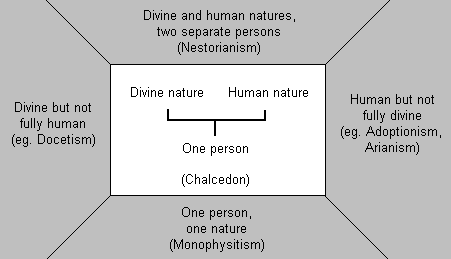 |
| The various views of Christ in the Early Church
Wikipedia
|
Thus, John 1:1 proclaims that Jesus is the Word, the One who is With God and is God. And John 1:14 voices one of the earliest statements of the Christian doctrine of the Incarnation: "And the Word became flesh, and live among us. We gazed upon his glory, glory like that of the father's only son, full of grace and truth." (Wright, The Kingdom New Testament). Jesus of Nazareth was also the Son of God the Father—the only son. John 5:19 further explaines that, "Whatever the father does, the son does too, and in the same way."
The thing is, however, that in the Gospel of John Jesus is not co-equal with the Father. Jesus is subordinate to the Father. In John 5:20 (following 5:19 cited above), we read that "The father loves the son...and shows him all the things that he's doing." That is, the Father teaches the Son, knows things the Son does not know. Further along, in 5:30, we find that Jesus says he can't do anything on his own authority. He wasn't carrying out his own wishes, "but the wishes of the one who sent me." This is not trinitarian thinking. In the doctrine of the Trinity, the three persons are in all respects co-equal. Each is fully God and, in fact, are a unity. In John, Jesus is not co-equal to the Father. The Father has greater authority than the Son and determines what it is that the Son is to do.
Clearly, the understanding of the person of Christ evolved over time, and in the process Jesus was understood in different ways by different communities within the early church and in different ways over time. The so-called Johannine community's view of Jesus was evolving into a "high christology," that is a view that maintained the divinity of Jesus, but it had not yet reached the zenith attained later in the doctrine of the Trinity.
There's a simple point here, namely, that the church's views of Jesus of Nazareth are always many. Simply translating Jesus into languages such as Thai changes the perception of him by those who speak that language. Phra Jesu, the Jesus of the Thai language, is a still higher divine being, a heavenly king and patron. The Jesus of America is actually a kindly democratic fellow, who loves all equally and never said a discouraging word. It is unfortunate that our differing views of Jesus tend to create walls between his followers instead of being seen as opportunities for dialogue. If Jesus was/is even remotely close to being who the vast majority of Christians claim he was/is, no one theology can contain all that there is to understand about him. Or, so it would seem.